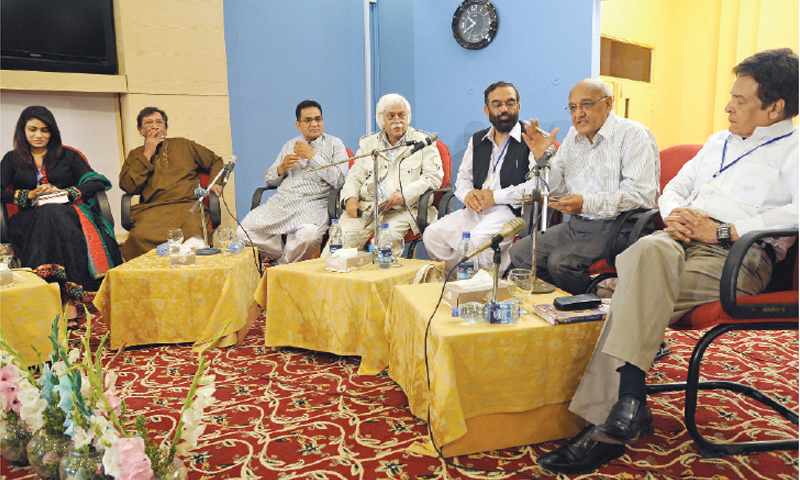ISLAMABAD: The Parveen Shakir Urdu Literature Festival 2014 opened this Friday at the Comsats Institute of Information Technology (CIIT). Organised by the Parveen Shakir Trust, the festival is the first of its kind in Pakistan and aims to promote Urdu literature in the country.
The festival featured several sessions on renowned Urdu writers and poets, including Mirza Ghalib, Faiz Ahmed Faiz, Allama Iqbal, and Parveen Shakir.
Mazharul Islam, one of the organisers of the festival, told Dawn that the festival aimed to promote Pakistan’s Urdu literary traditions and heritage, especially amongst the youth.
The festival opened with a session on Mirza Ghalib, moderated by Mazharul Islam and attended by renowned actor Talat Hussain, Professor Saeed Ahmed, poet Amjad Islam Amjad, Majid Qureishi, Iqra Aslam, actor Qavi Khan and Ali Raza.
A short clip featuring Ghalib’s work was played before the moderator explained that the session would be more of a celebration of Ghalib’s poetry than the man himself.
Speaking during the session, Ahmed said that Ghalib’s work was such that it could be interpreted in various ways, as it dealt with a broad range of disciplines, including religion and science.
Qureishi said that one would need a lifetime to properly introduce Mirza Ghalib and his work, before reciting Ye Na Thi Hamari Qismat.
Amjad Islam Amjad also recited from Ghalib’s canon and chose various verses that he believed encompassed the essence of his poetry.
Talat Hussain said that even though he was taught about Ghalib in school, he initially found his work quite difficult to digest and didn’t learn to appreciate it until he was older and could understand the complexity of Ghalib’s poetry.
He said that in Eastern culture, “philosophy gets lost in religion”.
Iqra Aslam and Ali Raza also sang two of Ghalib’s poems. Aslam sang Bazeecha-i-Atfal Hai Dunya Meray Aage and Raza recited Woh Firaaq Aur Woh Visaal Kahan. The festival also featured a session on Faiz Ahmed Faiz, attended by Khalil Ali, Ahmed Farooq, Farzana Bari, and Talat Hussain, among others.
Speaking at the session, Mr Ali said that while Faiz’ poetry was soft and beautiful, it was also hard-hitting and left a deep impression on the audience. He added that Faiz’ work was unlike any other’s in Urdu literature.
Farooq Ahmed discussed the poem Mauzoo-i-Sukhan and said that it differed from most of Faiz’ other works because typically, “Faiz’s poetry opens with romance and ends with bleak reality. This is the only poem where he begins with romance, touches on bleak reality, and comes back to romance”.
Bari focused on Faiz as a revolutionary poet, and recited Darbar-i-Watan Mein Jab Aik Din.
Later in the day, Talat Hussain conducted a session on the work of seminal poet N. M. Rashid and described him as a “poet’s poet” and “post-modern”. He also said that reading his works gave one a holistic vision of what his worldview was.
Noon Meem Rashid was one of the pioneers of blank verse and free verse in Urdu and as an innovator he had to bear the onslaught of tradition-bound criticism.
His poems, however, survived the criticism through their vigour and brevity, which had eluded Urdu poetry till then.
Initially his poetry appeared to be influenced by the works of John Keats, Robert Browning and Matthew Arnold and he wrote many sonnets after their fashion. But later, Rashid developed his own unique style.
The themes of Rashid’s poetry range from struggle against domination to the relationship between words and their meaning, between language and awareness and the creative process that produces poetry and other arts.
He rebelled against the traditional form of the ‘ghazal’ and became the first major exponent of free verse in Urdu Literature. His first book, Mavra, introduced free verse and is technically accomplished and lyrical.
Talat Hussain’s selection included the renowned poem, Zindagi se darte ho and was accompanied most ably by Wajihul Hasnain Nizami on the sitar. The music added to the ambience of the event as audience members lost themselves in Rashid’s timeless words.
Azam Athar, a businessman, said that he had enjoyed N. M. Rashid’s poetry since he was a young man and was delighted to hear it being read by an artist of Hussain’s caliber.
Beenish Toheed, a chartered accountant, said that this was the first time she had attended any forum where Urdu literature was being promoted publicly.
Mazharul Islam regretted that literature in English was given more importance than literature in Urdu. While the scale of the event was much smaller than that of English literature festivals, attendance was quite reasonable.
Parveen Qadir Agha, chairperson of the Parveen Shakir Trust, said that she was delighted with the turnout and hoped that such events would help the people of Pakistan understand the beauty of Urdu Literature.
Published in Dawn, May 31th, 2014















































Dear visitor, the comments section is undergoing an overhaul and will return soon.